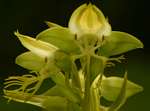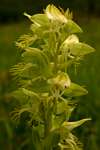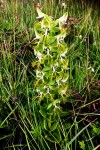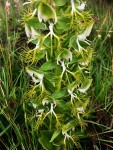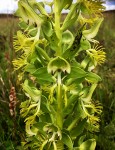| Home | > | List of families | > | Orchidaceae | > | Habenaria | > | praestans |
Habenaria praestans
praestans
Selected images: Click on each image to see a larger version and details of the record View all images (8)
Detailed records: Display species records QDS maps by: Google Maps Point records by Google Maps
Species details: Click on each item to see an explanation of that item (Note: opens a new window)
| Synonyms: |
Habenaria ctenophora Schltr. |
| Common names: | |
| Frequency: | |
| Status: | Native |
| Description: |
Robust terrestrial, up to 1m. Leaves along the stem, lower leaves sheathing, upper leaves spreading. Inflorescence up to 25 cm, densely many-flowered. Flowers green, white in the centre, strongly and sweetly scented. Dorsal sepal, concave. Lateral sepals green, spreading broadly lanceolate. Petals white, entire, curved, parallel with the dorsal sepal. Lip three-lobed; mid-lobe linear; side lobes elaborately fringed into comb-like segments on the outer margins. Spur up to 22mm, swollen near the tip. |
| Type location: |
Uganda |
| Notes: | |
| Derivation of specific name: | |
| Habitat: | |
| Altitude range: (metres) | |
| Flowering time: | Feb - Mar |
| Worldwide distribution: | DRC, Uganda, Ethiopia, Kenya, Tanzania, Malawi, Zambia and Zimbabwe. |
| National distribution: | |
| Growth form(s): | |
| Endemic status: | |
| Red data list status: | |
| Insects associated with this species: | |
| Spot characters: | Display spot characters for this species |
| Literature: |
Baumann, G. (2005). Photographic Guide to Wildflowers of Malawi Wildlife and Environmental Society of Malawi Pages 218 - 219. (Includes a picture). Burrows, J.E. & Willis, C.K. (eds) (2005). Plants of the Nyika Plateau Southern African Botanical Diversity Network Report No. 31 SABONET, Pretoria Page 328. Fibeck, W. & Dare, M. (1993). Terrestrial Orchids in Zimbabwe. Excelsa 16 Page 65. Fischer, E., Killmann, D., Delepierre, G. & Lebel, J-P. (2010). The Orchids of Rwanda Koblenz Geographical Colloquia Series Biogeographical Monographs 2 Pages 260 - 261. as H. praestans (Includes a picture). Grosvenor, R.K. (1976). A list of orchids indigenous in Rhodesia. Excelsa 6 Page 83. As Habenaria praestans La Croix, I. & Cribb, P.J. (1995). Orchidaceae (Part 1) Flora Zambesiaca 11(1) Page 75. Mapaura, A. & Timberlake, J. (eds) (2004). A checklist of Zimbabwean vascular plants Southern African Botanical Diversity Network Report No. 33 Sabonet, Pretoria and Harare Page 96. Phiri, P.S.M. (2005). A Checklist of Zambian Vascular Plants Southern African Botanical Diversity Network Report No. 32 Page 121. Williamson, G. (1977). The Orchids of South Central Africa J.M. Dent & Sons Ltd., London. Pages 43 - 44. As Habenaria praestans (Includes a picture). |
Other sources of information about Habenaria praestans var. praestans:
Our websites:
Flora of the DRC: Habenaria praestans var. praestansFlora of Malawi: Habenaria praestans var. praestans
Flora of Rwanda: Habenaria praestans var. praestans
Flora of Zambia: Habenaria praestans var. praestans
Flora of Zimbabwe: Habenaria praestans var. praestans
External websites:
African Plants: A Photo Guide (Senckenberg): Habenaria praestansAfrican Plant Database: Habenaria praestans
BHL (Biodiversity Heritage Library): Habenaria praestans
EOL (Encyclopedia of Life): Habenaria praestans
GBIF (Global Biodiversity Information Facility): Habenaria praestans
Google: Web - Images - Scholar
iNaturalist: Habenaria praestans
IPNI (International Plant Names Index): Habenaria praestans
JSTOR Plant Science: Habenaria praestans
Mansfeld World Database of Agricultural and Horticultural Crops: Habenaria praestans
Plants of the World Online: Habenaria praestans
Tropicos: Habenaria praestans
Wikipedia: Habenaria praestans
| Home | > | List of families | > | Orchidaceae | > | Habenaria | > | praestans |
